Can bearded dragons eat arugula? Arugula is not only safe but also exceptionally beneficial for these scaly companions. However, be mindful that individual preferences may vary among bearded dragons, and some might not immediately embrace the taste. Below, discover how to prepare this nutritious vegetable to ensure your reptilian friend receives the best culinary experience.
Another Interesting Read: Can Bearded Dragons Eat Green Beans?
If you savor the distinct peppery kick of arugula on your pizza, relish it in your salads, or use it as a delightful sandwich embellishment, you’re likely familiar with its unique flavor profile. Beyond its taste, arugula brings forth nutritional benefits, providing a rich supply of calcium, potassium, folate, Vitamin A, and Vitamin K.
Key Point: Arugula boasts essential nutrients like calcium, folate, and potassium, making it beneficial for bearded dragons. While it’s suitable for their diet every other day, individual preferences for its taste may vary.
Can Bearded Dragons Eat Arugula?
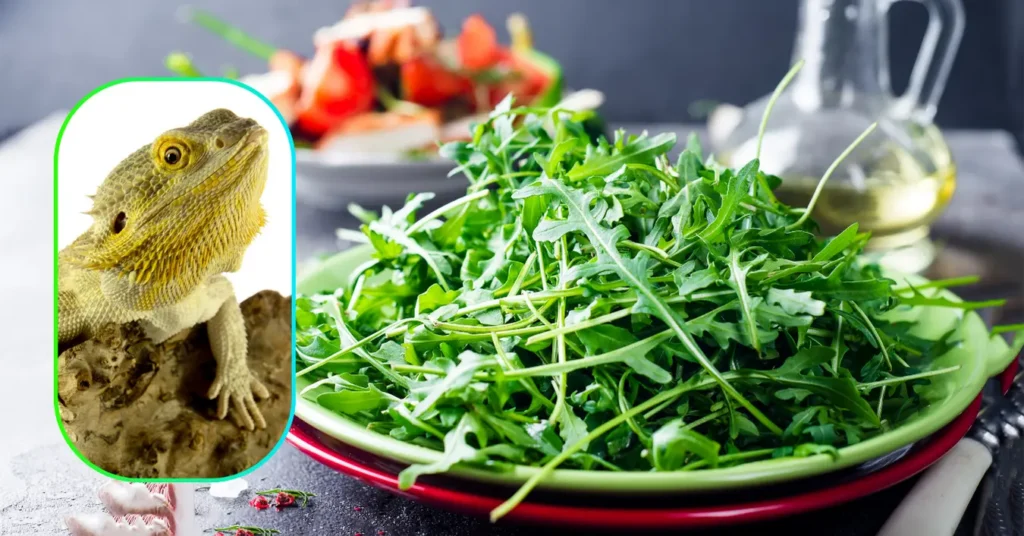
Yes, bearded dragons can eat arugula. It is a healthy green for them that is high in calcium, potassium, and folate, along with Vitamins A and K. It can even fight bad breath. Here are some of the benefits of arugula for bearded dragons:
Arugula is 92% water, so it can help keep your beardie hydrated and relieve constipation. Arugula has a 3:1 calcium-to-phosphorus ratio, which is great news for bearded dragons. Phosphorus interferes with calcium absorption, so it’s important not to feed your dragon too many foods that have more phosphorus than calcium.
This mineral helps regulate your dragon’s nervous system and blood pressure, plus keeps their muscles strong and healthy. Some beardies may not prefer the peppery taste. If your bearded dragon refuses to eat it after a bite or two, keep that in mind.
Overall, arugula is a healthy part of a balanced diet for bearded dragons. However, it should not be a staple veggie. Bearded dragons have the potential to include arugula in their diet every other day. It’s essential to note, though, that individual dragons may exhibit varied tastes.
Some dragons might be averse to the slightly bitter flavor of arugula, leading them to reject it after just a nibble or two. Consequently, you might find arugula more palatable for your dragon as an occasional addition to their salad repertoire.
Nutritional Value of Argula
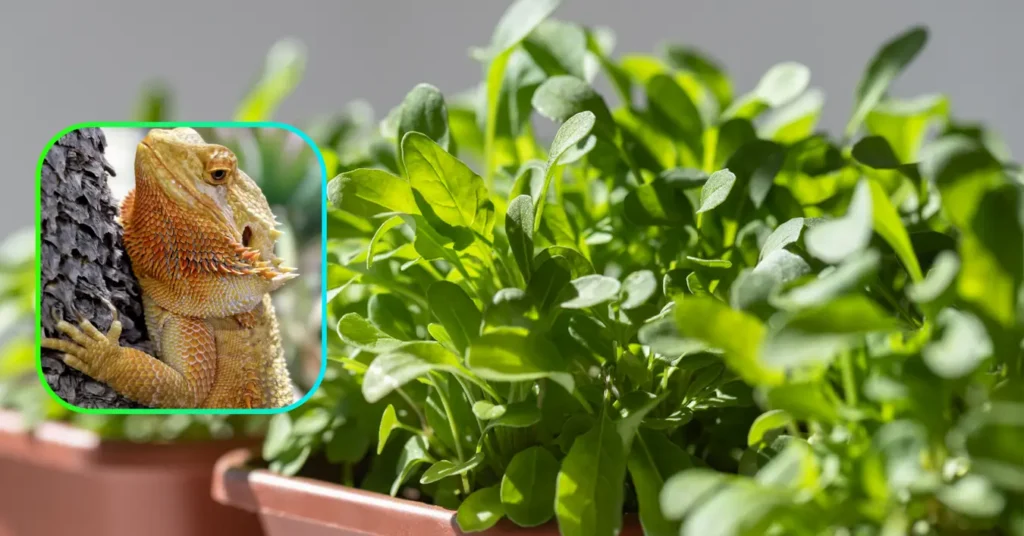
Arugula, scientifically known as Eruca vesicaria, emerges as a cruciferous delight, akin to its cousins, broccoli, kale, and cabbage. Delighting the palate with its peppery and spicy undertones, the flavor of its leaves tends to mature into a subtle bitterness over time. The versatility of arugula extends beyond its leaves, as its seeds prove to be delectable either in their whole form or when pressed to extract oil.
Venturing into the culinary realm, one encounters the intriguing variation known as “wild arugula,” distinguished by its heightened pungency. For those exploring supermarket aisles, the sight of “baby arugula” beckons.
Discover the diverse nutritional content found in a half-cup serving (10g) of arugula:
| Nutrient | Amount |
|---|---|
| Vitamin K | 10.9mcg |
| Protein | 0.3g |
| Sodium | 2.7mg |
| Sugars | 0.2g |
| Fat | 0.1g |
| Carbohydrates | 0.4g |
| Fiber | 0.2g |
| Vitamin C | 1.5mg |
| Calories | 2.5 |
Calories: Arugula stands out as a low-calorie green, providing about 5 calories per cup, aligning with the caloric content of spinach and kale.
Carbs: Arugula boasts minimal carbohydrate content, offering less than 1 gram per serving. If utilized as a salad base, a 2-cup serving of raw arugula can contribute around 0.8 grams of fiber.
Fat: As a leafy cruciferous vegetable, arugula is essentially fat-free, making it a wise choice for those mindful of their fat intake.
Protein: Arugula is notably low in protein. To enhance its nutritional profile when used in salads, consider pairing it with protein sources like chicken or legumes.
Vitamins and Minerals: Arugula excels in providing essential micronutrients such as beta-carotene, vitamin C, folate, vitamin K, and magnesium. A 2-cup serving fulfills 20% of daily vitamin A needs, 50% of vitamin K needs, and 8% each of vitamin C, folate, and calcium.
Arugula emerges as a nutrient-packed, low-calorie cruciferous vegetable, offering a spectrum of vitamins and minerals, making it a valuable addition to a balanced diet.
How to Properly Prepare Arugula?
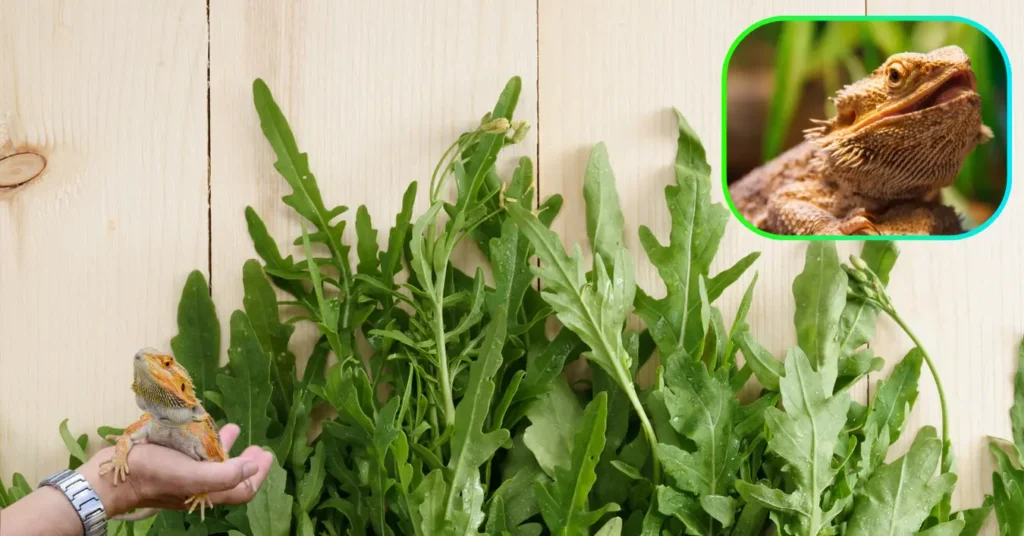
Arugula, a nutritious green, can be a beneficial addition to your bearded dragon’s diet, ideally served once a day. However, due to its robust flavor, some beardies may find it overwhelming, prompting many owners to recommend offering it once a week.
Here are some tips for feeding arugula to your bearded dragon:
Choosing baby arugula is preferable, as its leaves are more digestible, and the peppery intensity is gentler compared to mature leaves. To strike a balance of flavors, consider mixing arugula with other fruits and veggies.
Simple Steps for Preparation
Preparing arugula for your bearded dragon is a straightforward process. Just like with most vegetables, it’s essential to thoroughly wash the arugula before serving. This step ensures the removal of any loose debris and potential chemicals the plant may have encountered during transportation and storage.
Providing arugula to your bearded dragon is a straightforward process. Follow these uncomplicated steps to ensure a healthy treat for your scaly companion:
By following these simple steps, you not only provide a nutritious addition to your bearded dragon’s diet but also enhance their overall well-being. Remember, a thoughtful approach to feeding contributes to a happy and healthy reptilian companion.
Additionally, eliminate any larger, rigid stems that could pose digestion challenges for your beardie. Cut the remaining leaves into small, manageable pieces that are easy for your pet to chew or swallow whole. Keep in mind that no pieces should exceed the width between your bearded dragon’s eyes, ensuring safe consumption.
Why Can’t Dragons Eat Arugula Daily?
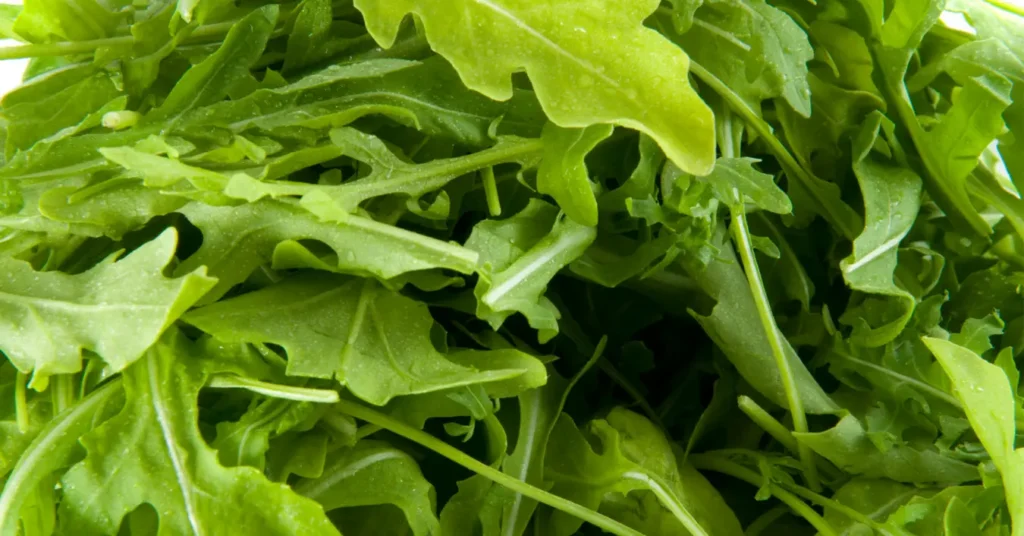
Bearded dragon enthusiasts often appreciate the nutritional benefits of arugula, particularly its richness in vitamin A, a vital element for your dragon’s well-being. However, vigilance is paramount among Dragon Keepers, as an excess of vitamin A can lead to a condition known as Vitamin A toxicity, adversely affecting your dragon’s health. Symptoms may manifest as swelling, lethargy, and a noticeable drop in weight.
It’s crucial to note that the risk of Vitamin A toxicity increases when dragons consume excessive amounts of foods high in Vitamin A, including carrots. This risk becomes more pronounced if dragons are regularly exposed to multivitamins as part of their diet. Striking a balance in their nutritional intake is essential to ensure the optimal health of these majestic creatures.
Side Effects of Arugula
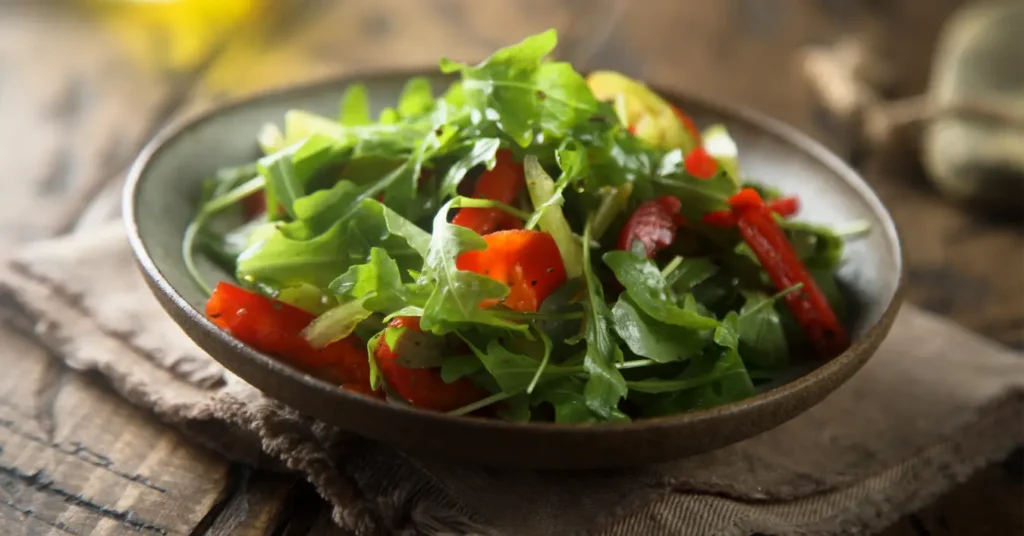
Arugula, with its vibrant leaves and distinct flavor, brings both positives and potential drawbacks. Let’s delve into the lesser-known side effects of this leafy green.
1. Watch Out for Sugar Traces:
Arugula harbors subtle traces of sugar, a factor to consider for the well-being of your pet. If not approached with caution, this can impact your beardie’s dental health. Opt for a balanced diet by occasionally substituting arugula with alternatives like squash and other low-sugar foods.
2. The Goitrogen Conundrum:
Similar to many leafy greens, Arugula contains goitrogens. While moderate levels are generally tolerable, an excess may jeopardize your pet’s thyroid, kidney, and liver functions. Despite its benefits, it’s prudent not to make arugula a daily dietary staple for your bearded dragon. Explore more on the subject in an article discussing whether bearded dragons can safely consume green bell peppers.
3. Sulforaphane Caution:
Arugula introduces Sulforaphane, a compound that warrants attention. Its interaction with calcium can lead to short-term issues such as abdominal cramps and flatulence in your pet. [7] For a well-rounded perspective, explore a piece on beardies’ consumption of insects and arugula.
Bonus Read | Can Bearded Dragons Eat Arugula?
Arugula is a healthy and nutritious food that can be a great addition to your bearded dragon’s diet. Just be sure to feed it to them in moderation and mix it with other greens to create a balanced diet.
If you want to feed arugula to your bearded dragon, there are a few things to keep in mind. First, wash the arugula thoroughly to remove any pesticides or herbicides. Second, cut the arugula into small pieces that your bearded dragon can easily eat. Third, start by feeding your bearded dragon a small amount of arugula and see how they react. If they seem to enjoy it, you can gradually increase the amount you feed them.
You Might Also Like:




